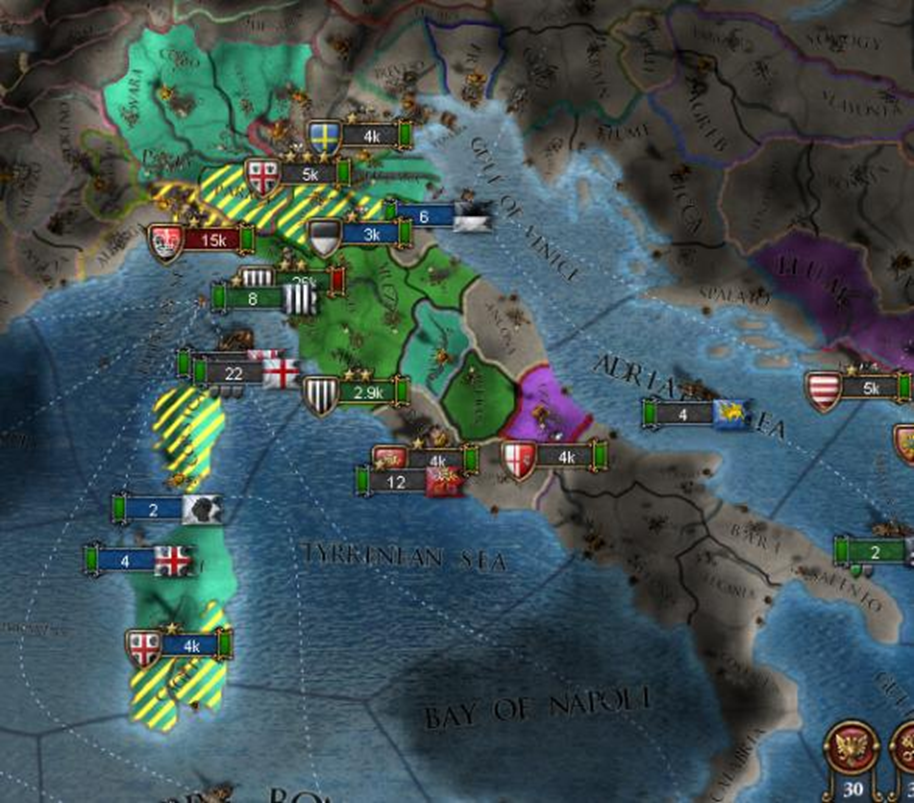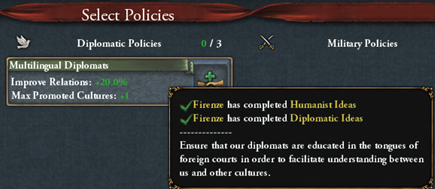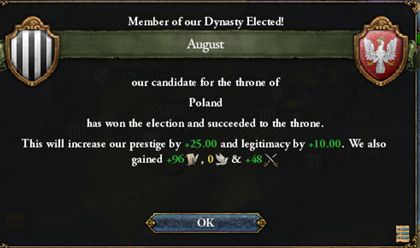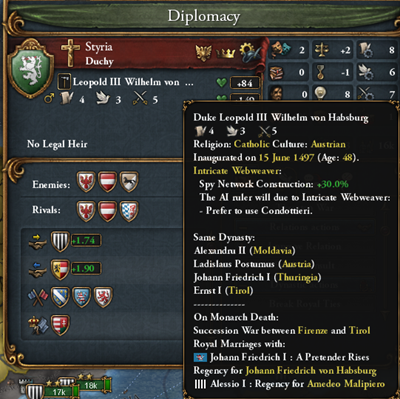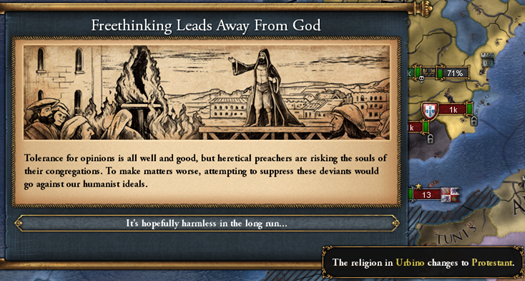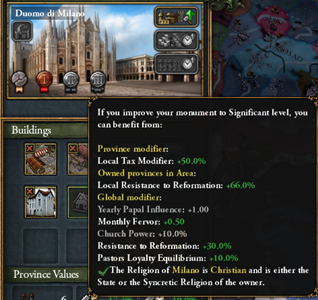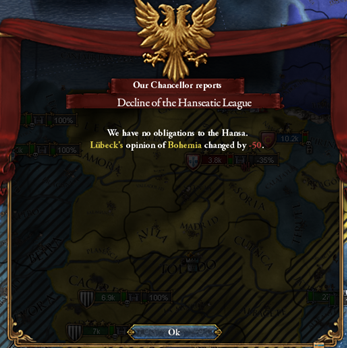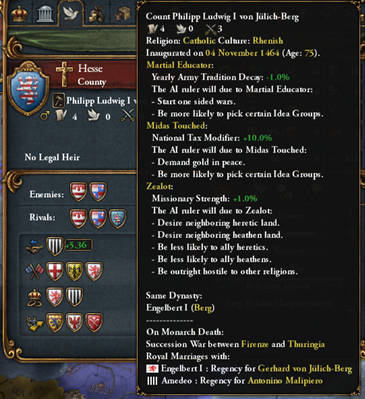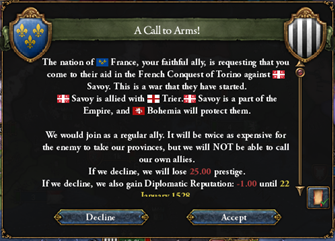Chapter 3 – One rein to rule them all
To try to salvage the Spoleto problem, Emperor Manfredo decided to bite an arrow (bullets weren’t invented yet) and grab Abruzzi from Naples –on a temporary basis, a solution advised from the council- until the vassal could be peacefully annexed. There were several paths to achieve this goal: Attacking directly Naples (allies Ferrara, Genoa, Pope) would had potentially allowed a humiliation and avoided spending diplomatic points for the province. Using Genoa as war target (Naples, Savoy, Naxos, Geneva, Cyprus) meant conflict with 2 Italian princes that could be reined, which was also in his plans, while having the opportunity to humiliate the trade republic as well. At the end, the emperor decided to keep it simple and easy by using Urbino’s claim on Ferrara (Naples, Pope).
However, he had to wait for a little while to allow the mercenary army return from the forests in middle Germany. He used this time to provoke a revolt among Sienese rebels and increase the regular army. Finally, in June 1459 war was declared on Ferrara, while calling the only ally willing to join, Burgundy. A swift attack to the enemy’s capital allowed to eradicate completely the Ferranese forces in 2 weeks, left a token regiment there and proceed to focus on the other participants.
The emperor started to improve relations with nations that could potentially become vassals in the near future, like Corfu (small, relatively close, outside of the HRE) knowing that the process would take a while. Regrettably to his cause, a temporary diplomat was permanently lost (one gained from first mission). A set back that was partially saved when a young member on the forces was sent to Rome to increase the influence with the Curia. (AE impact was nice, but with only 1 province to conquer -and return-, and 1 diplo slot free, decided to go with the +20 papal influence, spending some for a chance to become curia controller, for its bonuses.)
Then, in January of 1460 what first started as rumors heard between some of the Italian princes, regarding them feeling to be part of nothing but a shadow kingdom, grew louder. The imperial diet was summoned by the emperor to vote on the stance.
At the beginning of the negotiations, it was quickly noticed the vote was a split decision, with around 60 percent of the princes -including 2 electors- favoring to let the Italians go. Emperor Manfredo recalled every diplomat at his disposal, and sent them to try to convince some of the defectors about changing their point of view. “There is time, plenty of it” said the emperor.

Back to the war, Naples’ capital fell in June, and due to so much existing animosity between the combatants, the sack of the city started. The emperor heart was ferociously calling to let the army devastate completely the province, an action that would increase the treasury. But his cold mind convinced him to curb the excesses, aiming for a more disciplined and professional army. As emperor, the manpower pool at his disposal seemed endless, but even though Tuscany was a rich state, the funds would be better used through a small yet efficient army. He had to take a loan as reprimand for this decision. (No good deed goes unpunished)
The monetary situation improved momentarily, when the capital of Christendom surrendered (not sacking though) and the Pope signed a peace treaty, giving money, war reparations, transfer trade power & annul alliance with Naples. A new diplomatic idea was reached in December, improving the reputation of the realm and its ruler (+2 rep).
After this upgrading, the Emperor arranged a royal marriage with the very old and heirless duke of Landshut, convinced that that alone would make the latter to name a member of the Malipiero family as a successor. But the emperor was erroneous, since the duke still favoured his own dynasty on his throne. The emperor could defy that decision, but would been seen as the aggressor. (From roleplaying perspective, I would been “defending” the integrity of the empire, unsure if this can be considered diplomatic though)
Finally, the Shadow Kingdom incident as it was called, ended with a victory for the Emperor’s side, giving him less than 30 years to secure the Italian princes into the fold. Manfredo told himself and the diet he would do it. Still, relations with those who opposed this decision soured for some time.
Auspiciously, the Emperor observed how his named heir Alessio reached not only adulthood, but also was a recognized scholar among his peers, and his legitimacy was considered stronger than ever. (I’m more and more in love with this heir, hunting is forbidden)

War was still ravaging the Neapolitan provinces. The emperor’s main problem was lacking a proper navy to challenge the allies’ galleys. The Florentine ports were busy assembling cogs, but this construction was slow, taking a year for each. The only way to reduce her rival’s will for a proper treaty was to take the last bastion, which was on the island of Sicily. The army waited for months for an opportunity to cross the straits, which were protected by the galleys. The emperor moved his early ships between ports trying to lure the enemy. The plan worked after several attempts. This maneuver demoralized enough the Neapolitans to cede Abruzzi, giving their treasury and war reparations. (Wanted to humiliate, but Messina fort could take another year to fall with no navy, can always return later.)

When Ferrara’s capital fell a few days later, peace was signed for what was considered the common standard practice: money, reparations of war, trade power, but also annulled a rivalry to increase prestige. No land was taken. Nonetheless it did had to consequence of reining the Ferranese to the empire. (1 down, 7 to go). Since a few more wars were expected in the name of HRE unity, or as the emperor called them “aggressive negotiations”, the accumulated splendor permitted to improve taxation during conflicts for the following years.

But at the end of this war, in shocking news to Emperor Manfredo, what he considered a cunning plan from the council came to naught. Even when Abruzzi was only conquered to allow the annexation of Spoleto, he found out that the new province had to be cored to even start the process. In dismay, he ordered for it to be transferred to Spoleto, who had claim, knowing that it would allow for a quicker coring. Once that was done, he could integrate both provinces, and then most likely return Abruzzi to Naples, as repayment for sacking and devastating the city. (This was a bummer, but satisfies rule and roleplaying, the trait of my ruler is Just after all).
The emperor used the recent acquired wealth to finish the construction of temples in every province. He also thought about improving the trade center in the capital, but he waited for the opportunity to expand the great project of Santa Maria di Fiore. He sent a diplomat to improve relations with Landshut still hoping for a diplomatic transition, noticing that the duke had voted for abandoning Italy, and therefore against the emperor design, which still was resented.
Emperor Manfredo used this time of peace to seize land for the crown, reaching a healthy distribution (>30%) for the first time since his first day in office, which prevented some maluses in taxing and vassal relations. He was tempted to sell some back to the estates for money to keep expanding buildings, but he relented.
Even after completing a mission that gave extreme standing (+3 rep) and hiring a Stateman (+1) reaching unseen levels of admiration, the succession order in Castile (getting a Portuguese de Avis) and Landshut (falling on a PU under Denmark) remained unchanged. (It seems size matters, developing wise). Emperor Manfredo decided to continue in his efforts to rein in the Italians.

In August, Verona and ally Aquileia faced the emperor’s army (Urbino claim). The time he spent improving relations with other princes during the Shadow Kingdom incident has let the emperor almost forgot the polish election for their next monarch, and saw that while his candidate was still leading, others had come close. He dispatched a diplomat to rectify this situation and maintain the lead, even through his cousin was older than the current Polish king. As luck would have it, his impressive reputation attracted support beyond belief. (62% chance of increase, I have never seen anything like that before, not even as Austria).
By May 1462 both capitals in the war had fallen, and equally peace agreements were signed: money, war reparations, and transferring trade power. The emperor thought for a moment about releasing Padua from Verona, but he expected that the former would become another possible prince to rein and decided against it, for now. (3 down, 5 to go). He did remember to put Spoleto on scutage, to avoid calling them in future wars, since their coring of Abruzzi was expected to end soon, and the emperor was anxious to start the legal annexation and release of what he saw as illegal occupation.
In June Bologna shadowed the same handling than Verona. They had attacked friendless Ferrara, and the emperor still was undecided between allowing consolidation in the HRE or kept as many princes as possible for the authority increase. But since Ferrara had accepted the imperial mantle, Emperor Manfredo believe they could be saved. And for the surprise of everyone inside the realm and beyond the borders, news arrived that the Landshut duke had an heir. (At 76. Go, duke, go!). The Emperor hoped to complete his diplomatic ideas as soon as possible so he could abolish the unfruitful marriage with the old duke without serious repercussions. In the Castilian front, they were to fall under Portuguese direct rule, not dynasty, and France was expected to contest it. (Maybe I should had rivaled back Portugal. Still, what I really need to do is to grow in size ASAP to be taken seriously).
A new idea was unlocked in October, which in principle would have allowed to conquer more provinces had the emperor pursued a military approach. But more importantly, inspired the opening of a Secretary for Foreign Affairs, providing more relations with countries without overextending the current office. (+2 relations, 10 total). With Abruzzi coring done, the annexation of Spoleto started right away, and a royal marriage was proposed to Perugia, while rejecting one received from Bosnia. The small duchy next door was willing to be diplo vassalized, so the emperor was preparing the process for a smooth transition. (Perugia is a republic but did accepted RM after all, Bosnia is outside vassalization territory at the moment)

The annexation of Spoleto was expected to last less than a year due to the Emperor’s incredible diplomatic standing, but after unlocking the last idea, the diplomatic reserves were low and predicted to deplete during the takeover procedure. The emperor promoted his level 2 stateman twice (1 mis click) accomplishing a balance between incoming and outgoing resources. Spoleto would become part of the realm by April of next year. (Remembered to activate mission Acquire subjects + Nobility privilege to reduce annexation costs)
With Bologna signing the standard peace treaty, the Emperor saw that Savoy was not keen to defend Genoa in a war, and at the same time they were ready to accept an alliance, another way to retain the Italians in the HRE. Having an open position for a relation, Emperor Manfredo agreed. (5 down, 3 to go). Corsica was close to accept vassalisation, but the emperor hesitated, since to complete reining the princes, the easy way for bring in Montserrat was trough war with the mediterranean island. Before hostilities were declared, Genoa acknowledged Firenze as a rival. The emperor vowed publicly to teach the trade republic a lesson. This tarnished the emperor´s reputation, who ordered the guilty party executed, accepting a lost in stability (Need the diplo points to catch up in tech).

Spoleto was finally annexed in April, but when Emperor Manfredo went to return Abruzzi to Naples, we found that selling was not an option. And to return it he had to be at peace, likewise, to ally and vassalize Perugia. He decided to end quickly the war with Montferrat and Corsica.
During these times some news arrived in that Naples was considered a great power between the nations. Emperor Manfredo could only laugh to the insolent proclaim and expected to remediate it soon. He also observed that saving Ferrara from Bologna caused the former to fully annexed the latter. And his ally and royal consort’s country Milan embraced a horrific form of government.
Montferrat fell in October and signed the standard treaty. But Corsica´s coastal castle would take a long time to share the same fate, and the emperor hoped to use his charm to vassalize them eventually. He signed a settlement asking only for war reps. (7 down, 1 to go)
During peace time, an alliance was signed with Perugia, and they agree to become a vassal a month later. But when the emperor went to finally get rid of the troublesome province of Abruzzi, he found yet another problem, since would not become Neapolitan, but instead revive the country of Spoleto. (I clicked it, a promise is a promise. Guess I can try to vassalize and annex them again? ETA: Never mind, I have one core of them…)
Finally, war was declared on Genoa, and Savoy (expected) and Naples (unexpected) didn´t answered the call. The Savoyard ruler was malevolent, and the Neapolitan were over indebted. With Geneva & Cyprus as members of the trade league, Emperor Manfredo was not preoccupied. But instead of citing conquest, he declared humiliation casus belli. (Thought of show strength again for mana)
In January 1464, a new administrative technology (6) was unlocked, 2 full years ahead of time paying a small penalty in resources, since the Emperor was aiming to maintain the highest innovativeness. (Cheaper future tech & ideas). Workshops were built in every Tuscan province. When the Diplomatic ideas were fully completed in April, Emperor Manfredo canceled the royal marriage with Landshut with only a prestige hit, and started the process he called “fishing”, sending multiple proposals to countries with an old ruler and no heir, out of several options. Holstein and Brittany were selected, and after the wedding ceremonies both realms were candidates to fall in a personal union, with the latter could be contested by Provance.
When the Milanese declared a republic, the Emperor foresaw another aggressive negotiation that could be pursued, but the alliance was kept for HRE unity in mind. (Needed to complete rein in Italy, but since the game gave it, I suppose it wont break the rule).
The currying favors efforts in the Castilian court aiming to introduce a Malipiero heir turned to ashes when they fell under Portuguese rule, an action that was contested by the French, who were already at war with Provence. A royal marriage with an Irish country in the “fishing” strategy of the Emperor resulted in a possible dynasty spread on the Emerald Isle.
On Jan 1rst, 1465 another improvement in Military technology was achieved (6), with the resulting innovativeness being conserved. Diplomatic tech also progressed (5). These advancements had the expected consequence of eliminating Venice from the pool of valid rivals for Firenze.
After another long year waiting for their will to reach low levels, in July 1466 Genoa surrendered at last, giving away their treasury and accepts a humiliating peace. (8 down, 0 to go). The emperor decided money now was better than money later and ordered the upgrading of Firenze and Lucca trade centers. This resulted in all the Italian princes, one way or the other, to submitted to the Holy Roman Emperor will. The Shadow Kingdom prevented, boosted the imperial authority.
A couple moths later it was enough to pass another reform, which brought additional renown for Emperor Manfredo. To celebrate, he commanded the annexation of Urbino.
At the same time kept close watch of the problematic province of Abruzzi, which seemed destined to be the cause for never ending conflict. Spoleto ceased to exist (again) in the hands of Naples, and this caused a boundary dispute with the Emperor.
In the horizon appeared another opportunity and possible cause of problems, when a new imperial incident loomed like the sword of Damocles.






































































